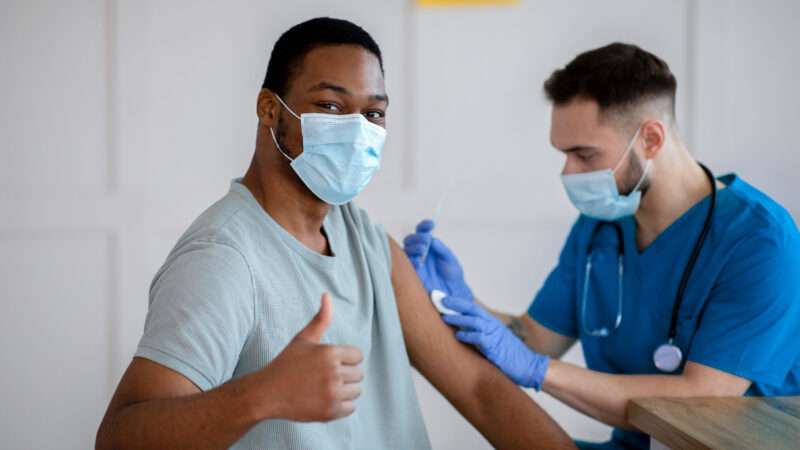
Less than two months after President Donald Trump declared the spread of the coronavirus responsible for COVID-19 a national emergency on March 13, 2020, I called for human challenge trials to quickly vet the safety and efficacy of COVID-19 vaccines. The Trump administration's Operation Warp Speed initiative was shortly thereafter announced; it aimed to "accelerate the development, manufacturing, and distribution of COVID-19 vaccines, therapeutics, and diagnostics."
Human challenge trials in which candidate vaccines and placebos are administered to consenting volunteers would certainly have cranked up the warp speed for COVID-19 vaccine deployment. Once vaccinated, the volunteers would be exposed to the COVID-19 virus to test the effectiveness of the vaccines in comparison to placebos for preventing and/or ameliorating infections. Such testing would have made it possible for vaccines to be deployed months before Pfizer's mRNA vaccine was finally given an emergency use authorization by the Food and Drug Administration (FDA) on December 11, 2020.
Prominent bioethicists argued that allowing healthy people to volunteer for COVID-19 vaccine human challenge trials would be no more dangerous than many other altruistic activities for which people are allowed to volunteer. Such activities include joining the military, volunteer firefighting, serving as living organ donors, and participating in phase 1 clinical trials. And volunteers for COVID-19 vaccine human challenge trials were not lacking. By June 2020, more than 28,000 people had volunteered to participate in such trials on 1Day Sooner, a website organized by a group of young researchers.
A recent study in the journal Clinical Infectious Diseases analyzes the adverse effects on volunteers in 308 human challenge trials involving over 15,000 participants since 1980. The researchers looked at "how risky such trials have been, how often adverse events (AEs) and serious adverse events (SAEs) occur, and whether risk mitigation measures have been effective." AEs refer to "any untoward medical occurrence associated with the use of a drug in humans" and SAEs include death, hospitalization, disability, permanent damage, or other important medical events.
The researchers found that only 24 (0.2 percent) of the volunteers in the human challenge trials they analyzed experienced SAEs. Among these were 10 volunteers in E. coli and Norovirus studies that suffered episodes of severe diarrhea and vomiting and 7 malaria treatment volunteers who experienced cardiac and liver issues that resolved without permanent harm. The researchers note that zero deaths occurred in these trials. The researchers observe, "It is unlikely that any SAEs captured in this review were life-threatening because the events were primarily brief hospitalizations for observation or supportive care requiring noninvasive interventions."
No serious adverse events were reported in the United Kingdom human challenge trial in which volunteers were exposed to the COVID-19 virus so that researchers could carefully track the natural course of the infection.
Would jumpstarting the administration of COVID-19 vaccines using safety and efficacy data obtained quickly from human challenge trials have averted more deaths, hospitalizations, and the sheer misery of illness than actually occurred? Yes. After all, a July 2022 report estimated that 10 months after their rollout in December 2020, the COVID-19 vaccines may have averted around 27 million infections, 1.6 million hospitalizations, and 235,000 deaths. Conversely, an April 2023 study calculates that between May 2021 and September 2022, at least 232,000 deaths could have been prevented among unvaccinated adults in the United States had they been vaccinated with the original COVID-19 vaccines.
With respect to adverse events, it is worth noting that a February 2023 study evaluated the death reports for COVID-19 vaccine recipients in the United States in the Vaccine Adverse Event Reporting System (VAERS). The researchers found that the death rates for vaccinated people were lower than the all-cause death rates expected in the general population. Consequently, they observe, "These findings do not suggest an association between vaccination and overall increased mortality."
Given that other infectious diseases with pandemic potential are lurking out in the wild, our public health authorities (the FDA and the Centers for Disease Control and Prevention) need urgently to develop and deploy a logistical and ethical framework for approving human challenge trials for vaccines sooner rather than later. The sorry performance of those agencies over the last three years infuriatingly suggests that that will not happen.
The post It's OK To Let People Take Risks for Medical Science appeared first on Reason.com.







